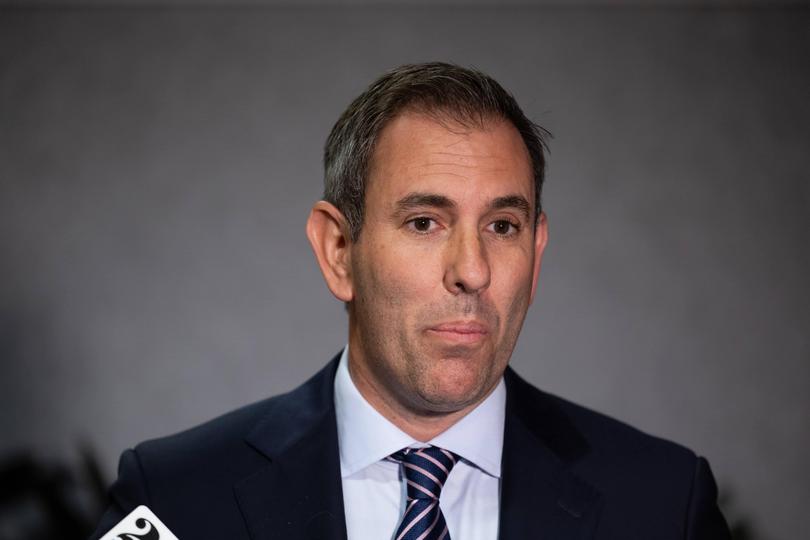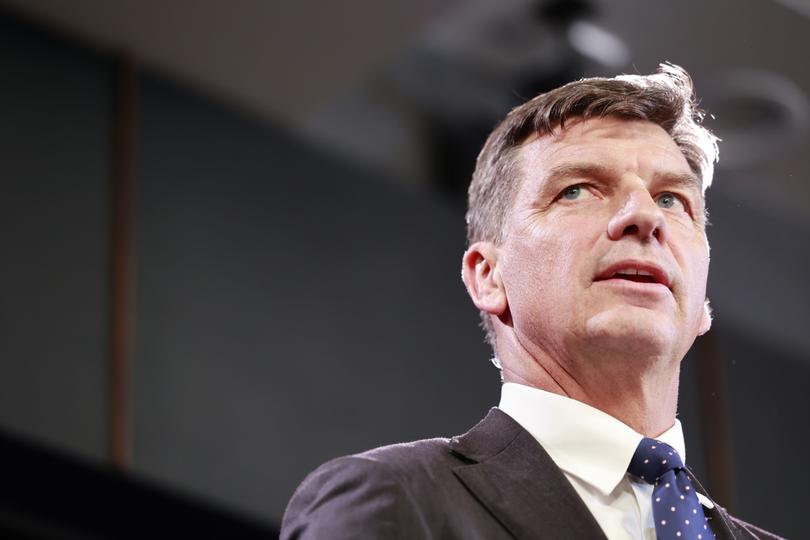JACKSON HEWETT: Chalmers was dealt some favourable cards this campaign. How will he play them if re-elected?
JACKSON HEWETT: In an election full of mudslinging over the country’s finances, it’s a shame that the clearest voice was the least heard.

In an election full of mudslinging over the country’s finances, it’s a shame that the clearest voice was the least heard.
The usually mild-mannered S&P Global dropped a too-little-too-late bombshell about the truckloads of cash being dumped on would-be voters, but it at least came ahead of both parties’ costings, which arrived so late in the cycle they were virtually meaningless to exhausted voters.
S&P, whose ratings influence how much interest entities pay on debt, warned that Australia was at risk of losing its prized AAA rating — something just 11 countries have the privilege of owning.
Sign up to The Nightly's newsletters.
Get the first look at the digital newspaper, curated daily stories and breaking headlines delivered to your inbox.
By continuing you agree to our Terms and Privacy Policy.Treasurer Jim Chalmers all but brushed off the rating agency’s concerns, while Shadow Treasurer Angus Taylor tried to use them as a cudgel against the Government, choking down the very obvious fact that the handouts forced upon him by Liberal Party HQ would make matters worse in the near term.
Veteran Budget watcher Chris Richardson put it best, describing both parties’ fiscal efforts as “fat and lazy, filled with terrible taxes and stupid spending”, lamenting the fact that the can has been kicked so many times down the road it now resembles a crumpled ball of tin foil.
“We need our politicians to do better,” Mr Richardson said.
Unfortunately, the fiscal restraint that was once a hallmark of Australian economic management has been broken by the monumental bar tab racked up during COVID.
Dr Chalmers argues Labor has steered the country out of a period of high inflation caused by both the pandemic and the invasion of Ukraine, and he can credibly assert that under Labor the country has returned to sustainable inflation levels without job losses (although I reckon Michelle Bullock would blitz all comers if put forward for preferred PM).
But Labor has had monumental luck in terms of timing in this election. It came to power at the peak of the inflation curve and, like pretty much every other nation, rode the fall as supply chains reopened and energy prices stabilised.
It has had even more luck from a once-in-a-generation boom in commodity prices — particularly coal — as a result of the war in Ukraine. Top-quality NSW thermal coal rose more than three-fold as countries scrambled to secure supply, while met coal, used in steelmaking, also soared. That helped deliver $400 billion in windfall gains to Labor, enabling it to crow about “repairing the budget”.
Donald Trump has not only helped Labor’s optics against the Coalition — his crazed tariff policies have slugged global growth and helped push oil prices down to $US60 per barrel, half their June 2022 peak.

Analysts expect oil prices to drop even further, sucking the urgency out of the Coalition’s plan to pump-prime voters with a 25 cent cut to the fuel rebate. When asked by The Nightly if blowing a $7 billion hole in his budget on a declining fuel price was a waste of money, Angus Taylor harked back to the cost-of-living crisis.
“Twenty-five cents a litre, regardless of fuel price, is a welcome relief, and I hear that on the polling booths,” he said, confirming why there has been so much tit-for-tat spending promises.
Mr Taylor said he was thinking of two budgets — the household’s and the nation’s.
Households are more than happy to shovel borrowed Federal funds into budget repair, with new data from Westpac showing that households are pocketing 80¢ from every extra dollar of income received from the tax cuts. They intrinsically understand that getting out from under a mountain of debt is critical for long-term financial health.
What a shame that message has been overlooked at a national level as both sides jostle for control of the economic levers. The Coalition at least is talking about getting spending down.
But the party that wins will eventually have no choice but to come clean to voters.
The Budget is in bad shape and needs to be fixed, with interest on debt the fastest-growing line item for government spending.
The shackles on spending unleashed by COVID need to be restored, and a sensible conversation had about the tax system we have.
Because looking forward, the global picture is poor.
S&P put out a new assessment of the global economy based on Trump’s tariffs, which finds that China’s economy will slow to 3.5 per cent in 2025 and 3 per cent in 2026 — down almost a full percentage point from their forecast a little over a month ago. That compares to a 5 per cent growth rate in 2024.
China, via its purchase of iron ore and coal, accounts for about 8 per cent of Australian GDP, and Asia accounts for 85 per cent of our exports. Japan and Korea — our next largest customers — are also in the tariff firing line.
Next year, the Budget deficit is forecast to hit $41 billion, before tapering downwards in the out years, thanks primarily to Treasury’s prediction that GDP growth returns to 2.5 per cent by 2026–27 and more tax revenue flows in.
That $41 billion deficit may not be as bad by March next year once the true figure for company tax receipts, based on actual iron ore and coal prices rather than Treasury’s much lower base case, is revealed.
But S&P has bad news for Australia there, too.
At a commodity conference in Sydney on Thursday, analysts for both iron ore and coal painted a picture of declining prices.

In China, steel mills are already facing razor-thin margins thanks to Trump’s tariffs and are buying cheaper grades of iron ore just to preserve what profits they have.
Already, S&P Platts is seeing iron ore prices 30 per cent below 2022 levels and has downgraded its forecast for 2025 to $US97 a tonne. Thermal coal, another large Budget revenue source, is forecast to fall to as low as $70 a tonne.
Unless the trade war ends quickly, expect those windfall receipts to dry up.
The fallout from the trade war — and America’s abdication from its role as bulwark of the global trading system — is also yet to be fully counted.
Trade is one thing; the health of the global financial system is another.
S&P’s APAC chief economist Louis Kuijs warns of a “liquidity or credit event” reminiscent of the GFC. He is not alone — globally influential investors like Ray Dalio warn it’s already too late to properly plan for the breakdown of the global monetary order.
Those are just a few of the short-term headwinds facing the next Treasurer. The longer-term ones remain unresolved.
As Matt Nolan and Lachlan Voss, economists at think tank e61, note: “Demographic trends are king.”
They say Australia is on an unsustainable path, with Budget deficits rising to 2.9 per cent over the next decade.
“With population ageing expected to accelerate through the late 2030s, fertility on the decline, and both major parties seeking to pull back on young migrants, the upward pressure on deficits and interest payments will simply get worse,” they write.
Tomorrow’s election will hand either Jim Chalmers or Angus Taylor the keys to Treasury; come Monday, one of them will have to start the hard work of telling voters the party is over.

